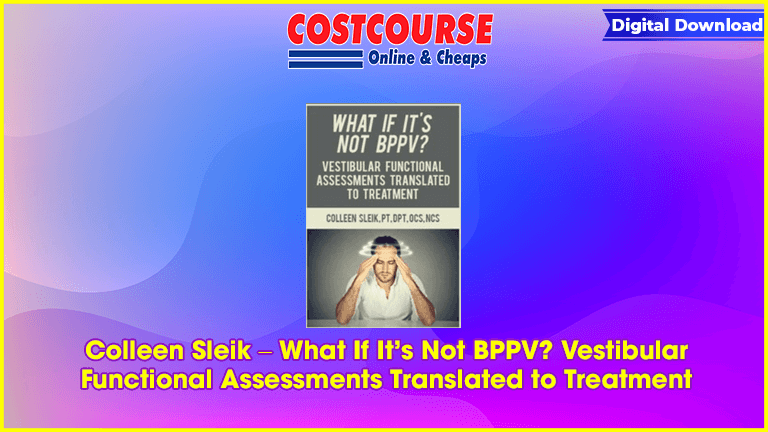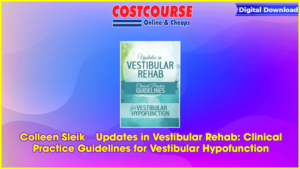Description
Benign paroxysmal positional vertigo is the most well-known form of dizziness, however there are multiple other conditions that can cause symptoms of dizziness, motion sensitivity imbalance, and falls.
Colleen Sleik – What If It’s Not BPPV? Vestibular Functional Assessments Translated to Treatment
This session will introduce multiple vestibular functional assessments that can be used to assess each area of the vestibular rehabilitation program. Findings from these assessments will direct the clinician’s clinical decision-making with regard to appropriate treatment techniques to minimize or eliminate dizziness, decrease risk of falls, and restore function.
Handouts
Manual – What If It’s Not BPPV? (2.6 MB) 42 Pages Available after Purchase
Outline
Introduction to vestibular rehabilitation
Discussion of vestibular functional assessments to include:
Motion Sensitivity Quotient
Dynamic Visual Acuity Test
Balance Assessments: Five time sit to stand, Dynamic Gait Index, mCTSIB,
Gait speed
Discussion of findings from above assessments and how to translate into treatment techniques
What information can be gained from each assessment
How does this translate into function
How to incorporate functional daily/work activities into the vestibular rehabilitation program
Discussion of how to incorporate and progress a treatment plan to address the four areas of a vestibular rehabilitation program:
Habituation
Gaze stabilization
Balance and gait
Endurance
Review of case study findings for both subjective and objective measures
Discussion of impairments and functional limitations
Translation of assessment findings into treatment
Discuss treatment options to address each of the four components of a vestibular rehabilitation program: gaze stabilization, habituation, balance/gait, endurance
Options for progression of treatment
Faculty
Colleen Sleik, PT, DPT, OCS, NCS
Focus On Function Physical Therapy PC
Colleen Sleik, PT, DPT, OCS, NCS, is a licensed physical therapist, specializing in the treatment of patients with vestibular disorders when other forms of medical management have failed. Dr. Sleik founded a private practice in 2010 with the primary focus of treating patients with vestibular conditions. She continues to work as a specialist at Dickenson Rehab Services where more than 90% of her caseload consists of patients with vestibular and balance disorders.
Dr. Sleik graduated from The College of St. Catherine with a Master’s in physical therapy. She earned a transitional Doctor of physical therapy degree through The University of St. Augustine, Florida, and completed the Competency-Based Vestibular Rehabilitation course through Emory University in Atlanta, Georgia. In addition to board-certification as an Orthopaedic Clinical Specialist and Neurologic Clinical Specialist, Dr. Sleik is a member of the American Physical Therapy Association, including the Academy of Neurologic Physical Therapists, and the Vestibular Special Interest Group.
She began teaching continuing education courses in vestibular rehabilitation with the purpose of improving clinicians’ knowledge in the specialty of vestibular rehabilitation and ultimately improving the quality of patient care. Dr. Sleik’s goal as a clinician is to provide her patients with the best care available for return to daily function with minimal limitations, while also providing the tools for long-term self-management of symptoms.
Speaker Disclosures:
Financial: Colleen Sleik has an employment relationship with Dickinson County Health Care System; and Aegis Therapies, Golden Living Center. She receives a speaking honorarium from PESI, Inc.
Non-financial: Colleen Sleik is a member of the American Physical Therapy Association.








